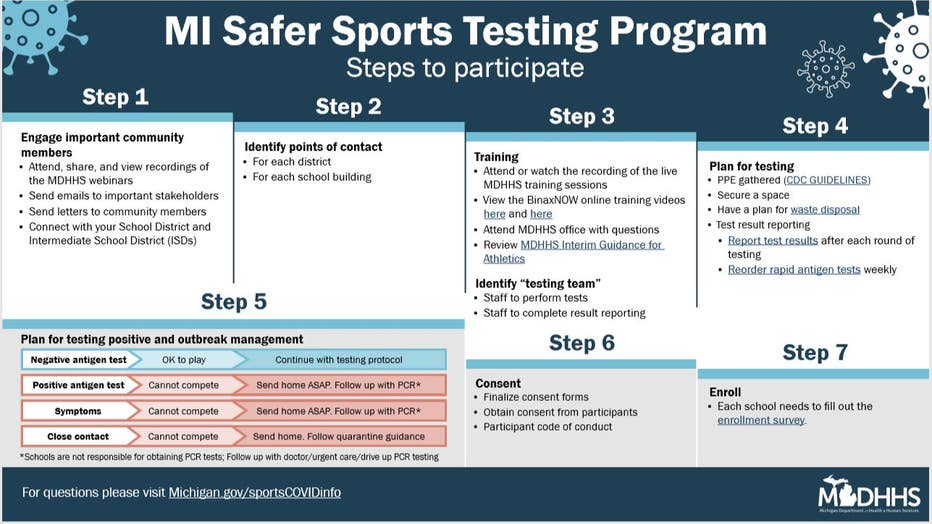Michigan student athletes age 13-19 must get weekly COVID-19 tests to participate

Gov. Whitmer announces more attendance allowed at outdoor stadiums, increase HS sports testing
Michigan is announcing more fans can attend outdoor sporting events while also increasing testing for high school student-athletes as more cases have been connected to schools over the past few weeks.
LANSING, Mich. - Michigan is mandating testing among high school student-athletes after rising infections in the state were partly attributed to outbreaks among organized athletics.
On Friday, the state said it was increasing testing capacity for students ages 13-19 in an effort to better identify COVID-19 cases in high school athletic settings. The governor also said student-athletes would be required to get tested before every competition and practice.
Michigan has mapped out a seven-step process for schools that includes mandating districts to identify points of contact, develop a plan for antigen testing, as well as performing the testing itself. The antigen tests will be provided by the state.
Students will need a negative antigen test before they are cleared to play.
"Last week's numbers are a reality check - COVID-19 is not behind us," Gov. Gretchen Whitmer said during a Friday news conference. Michigan is one of 10 states that is seeking increases in infections after pushing down the spread of the virus in January and February. Part of the reason for that increase is outbreaks in schools.

Gov. Whitmer announces epidemic order changes including increased fan attendance, HS testing
On Friday, as Michigan's COVID-19 cases continue trending in the wrong direction, Gov. Gretchen Whitmer announced High School student-athletes would be subjected to testing before every practice and game to curb the spread of the virus.
A school's guide to participating in sports
Under the MI Safer Sports Testing Program, students and districts must abide by seven steps before athletes can participate. The state will provide free antigen tests to teams of eligible student-athletes who are now required to be screened before participating in athletics.

(Michigan Department of Health and Human Services)
Students that are age 13-19 that are part of school-sanctioned, contact sports teams will be eligible for a test.
Schools that hope to offer sports will need to participate in the program, which features a seven-step plan for guiding schools with athletic activities:
- Schools must engage the community by offering MDHHS webinars and keep parents and students connected with the district
- Identify points of contact for each district and school building
- Participate in training sessions provided by MDHHS and identify a team that can conduct testing of athletes.
- Outline a testing plan that includes necessary PPE, a place for waste disposal, and a system for reporting test results.
- If students test negative, they are allowed to participate. But if they test positive, have contact with someone who tests positive or has symptoms, they cannot
- Hand out and finalize consent forms from student-athletes
- Fill out a survey
All relevant information for schools can be found on the state's website here.
Coronavirus increasing in students
One of the previous epidemic order updates earlier this year included guidelines for allowing contact high school sports to resume. That order was announced Feb. 4. However, kids ages 10-19 have been found to be among the groups seeing the largest increases in cases, according to data from MDHHS this week.
On Wednesday, the state's chief health officer and epidemiologist cited outbreaks in high school settings and activities associated with them as being one of the main sources driving Michigan's third surge of cases.
"The implementation of the testing program that allowed student-athletes to complete their fall seasons provided much needed closure, and we at Frankenmuth High School benefitted from this program," said the school's principal JoLynn Clark. "It allowed us to not only finish the fall season, but also provided opportunities for student-athletes in winter sports."
"Rapid antigen testing has served as an effective mitigation strategy that protects in-person instructional time and allows students extracurricular opportunities," she added."
The health department is currently tracking 645 identified outbreaks of COVID-19, including 170 in just the last week, among K-12 schools. High schools made up the vast majority of those instances.
Local health departments identified 315 outbreaks associated with different sports teams in January and February.

